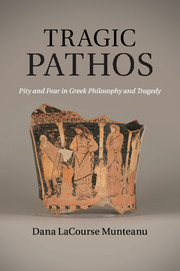Book contents
- Frontmatter
- Contents
- Preface and acknowledgments
- List of abbreviations
- Introduction
- Part i Theoretical views about pity and fear as aesthetic emotions
- Chapter 1 Drama and the emotions: an Indo-European connection?
- Chapter 2 Gorgias: a strange trio, the poetic emotions
- Chapter 3 Plato: from reality to tragedy and back
- Chapter 4 Aristotle: the first “theorist” of the aesthetic emotions
- Part ii Pity and fear within tragedies
- Appendix Catharsis and the emotions in the definition of tragedy in the Poetics
- Bibliography
- Index
Chapter 2 - Gorgias: a strange trio, the poetic emotions
Published online by Cambridge University Press: 05 December 2011
- Frontmatter
- Contents
- Preface and acknowledgments
- List of abbreviations
- Introduction
- Part i Theoretical views about pity and fear as aesthetic emotions
- Chapter 1 Drama and the emotions: an Indo-European connection?
- Chapter 2 Gorgias: a strange trio, the poetic emotions
- Chapter 3 Plato: from reality to tragedy and back
- Chapter 4 Aristotle: the first “theorist” of the aesthetic emotions
- Part ii Pity and fear within tragedies
- Appendix Catharsis and the emotions in the definition of tragedy in the Poetics
- Bibliography
- Index
Summary
Gorgias (c. 485–380 bce) associates pity and fear to describe the effect of poetry on the audience in the Encomium to Helen. In this piece of rhetorical virtuosity, simultaneously designed as laudatory discourse, apology, and intellectual joke, Gorgias intends to exculpate the infamous heroine of Greek mythology and, in his attempts to do so, he describes the power of language. Speech, a master who governs the world through its seductive power, must have persuaded Helen to go to Troy: a perfect excuse for the heroine's behavior. Speech can persuade and move everyone; more specifically, poetic speech arouses irresistible emotions, such as shivering “fear” (φρίκη) and “pity” (ἔλεος), (Hel. 9). As scholars have remarked, this observation, as well as a later comparison between the emotional effects of speech and drugs (Hel. 14), seems to prefigure the Aristotelian poetic theory. In fact, the treatment of the emotions in the Encomium deserves a closer examination. Hence, I next discuss the numerous other references to pity and fear, which reveal important information about the nature of each emotion as well as the complex relationship that exists between them.
Context (a): pity and hatred, guided reactions for gorgias’ audience (hel. 7)
Summary: Helen may have been kidnapped by Paris and taken away from her country. In this case, shouldn't she “reasonably be pitied” (εἰκότως ἐλεηθείη) rather than reviled? If she herself did not willingly perform a malicious act but only suffered misfortune, it is right “to pity” (οἰκτίρειν) her and “hate” (μισῆσαι) the one who has inflicted suffering upon her.
While Gorgias proposes an unusual version of the myth, he also indicates to his readers the correct emotional reactions to this possible story. In this scenario, Helen has “suffered” (ἔπαθε) undeservedly, as do (or claim) many characters in tragedy, and therefore she ought to be pitied, whereas Paris “has performed” (ἔδρασε) terrible acts, and therefore he should be hated. Two points are of interest. Firstly, pity is indicated to the audience as a “reasonably” (εἰκότως) felt response to the fate of the heroine, since she suffers undeservedly. The term “reasonably” suggests correlation between a specific course of the narrative and the emotional reaction of the reader, which does not differ from the emotion that a real event may arouse. If the events of the story unfolded in such a way, then the audience should react accordingly (i.e. feel pity). Later on, Aristotle insists on the importance of the probable sequence of events in the tragic plot (i.e. dramatic events should happen on account of one another), to elicit what he considers the appropriate tragic emotions. Secondly, pity is paired with hatred, a fascinating association, particularly when applied to tragedy. If the spectators respond with pity to the undeserved suffering of a hero, should they also feel simultaneously “hatred” toward those who inflict such suffering? Simply put, does the spectator's pity for Antigone require hatred for Creon? As I suggest later on, Greek tragedies often raise the problem of whether or not suffering is deserved, which Aristotle encapsulates in his famous concept of hamartia, “error” of the tragic character. Degrees of tragic “culpability” usually pose more complex cognitive and, therefore, emotional assessments from the audiences than simple opposites: innocent–guilty characters. Nevertheless, in many instances characters in Greek tragedy emphasize the undeserved nature of their suffering. Indeed, it is surprising that classical authors do not underscore more often this connection between pity and hatred, the opposite reactions that must be considered when assessing a spectator's responses to undeserved suffering (whether fictional or not).
- Type
- Chapter
- Information
- Tragic PathosPity and Fear in Greek Philosophy and Tragedy, pp. 37 - 51Publisher: Cambridge University PressPrint publication year: 2011

